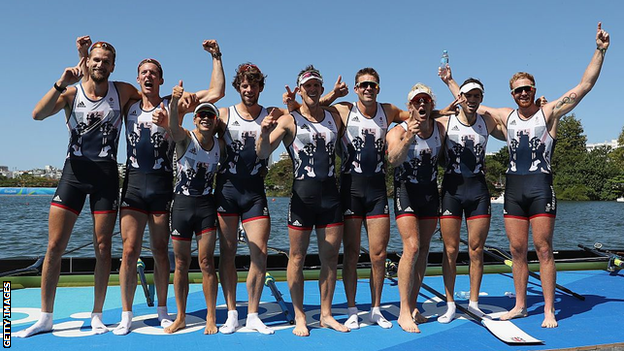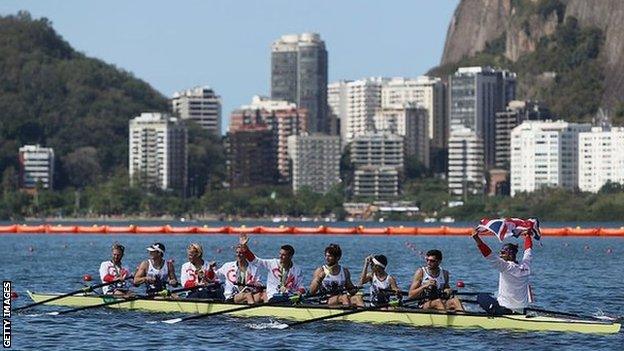Olympics Rewind: Pete Reed on Rio 2016 gold and spinal stroke recovery
- Published

Pete Reed (fourth from right) with crew-mates Paul Bennett, Scott Durant, Phelan Hill, Tom Ransley, Matt Langridge, Andrew Triggs Hodge, Matt Gotrel and Will Satch
Olympic highlights on the BBC |
|---|
20-24 July: Olympics Rewind: Rio 2016 - BBC Two 15:55 BST |
25 July: Britain's greatest Olympic moments - BBC One 13:15 BST |
Britain's men's eight were in the minibus back to their Rio accommodation as newly crowned Olympic champions when Will Satch asked a question.
"Did anyone else back off in the last 250 metres because they knew we had won?"
Everyone put their hand up - except Pete Reed.
"I'm sure he was joking. I hope he was being flippant," Reed says. "The race was done in that last 250 metres, but I was just desperate to get more."
His desire to push harder in a race already won is an example of Reed's remarkable character, his relentless positivity and indomitable spirit.
That nature has come to the fore over the past 10 months, since the 38-year-old suffered a spinal stroke that paralysed him from the chest down.
Reed's reality now is very different to what it was during that magical fortnight in Brazil almost exactly four years ago.
His once towering 6ft 6in physique now requires a wheelchair, his days a timetable of physiotherapy, hydrotherapy and occupational therapy at a military rehabilitation centre - yet watching back videos of his days as an elite athlete does not faze him one bit.
"It's very difficult to compare now, so I don't - and I certainly don't dwell," says Reed, a Lieutenant Commander in the Royal Navy.
"When I look back and think about how fit, strong, able and skilful I was to being in a wheelchair where I'm trying to move my leg a little bit or trying to wiggle my toe, the difference is staggering and the drop is significant.
"It would be all too easy to dwell on how strong I used to be, what I used to do, and what a parallel life would have been like if I hadn't had my injury.
"But actually, as I'm growing more experienced in a wheelchair, there's nothing dangerous about looking back any more. I'm just proud of what I did."
Rio marked Reed's third Olympics, and his third title. As far as British rowing is concerned, only Sir Steve Redgrave and Sir Matthew Pinsent have won more Olympic golds.
But speaking to BBC Sport as part of the Olympics Rewind series, it is clear that Reed has a special fondness for what turned out to be his final Games.
"I've got to be careful here, but I think it was the time of my life," he says.
"I went to three Olympics and often get asked which was the best. Often my answer is London because it was a home Games, but personally for me and the journey I was on, Rio was something extra special."
'Of course we were going to win in Rio'

Reed (waving, centre) won men's eight gold at Rio 2016, having won men's four gold at Beijing 2008 and London 2012. He is also a five-time world champion
Despite the crew winning three World Championship titles between the 2012 and 2016 Olympics, Britain's men's eight went into Rio on the back of a unsatisfactory season from which they had no victories to show.
But in the lead-up to Rio, in the days before and the morning of the final, Reed and his crew-mates felt an abundance of positivity. They were ready.
"I knew we were going to win. It might sound arrogant, but when you're in it you just have so much self-belief and belief in your crew that of course we were going to win," says Reed.
"Sitting on the start line, I just thought: 'I wouldn't trade anyone in this crew for anyone in any other crew.'"
In a "textbook eights race", Great Britain won gold by more than a second from Germany.
"Everything about it was just a masterclass in teamwork," he adds.
"It was almost like having a street fight with your gang. The eights is just a bit different, it's more feral. We were just ready for the fight of our lives.
"I remember saying in an interview then that I would have died for anyone in the crew, and I'm pretty sure the others would say the same as well."
The days after the race were a haze of partying and supporting fellow Team GB athletes. "I really, really was happy," Reed says. "It was the stuff dreams are made of."
He had thought about retiring, but changed his mind during the closing ceremony when he watched the handover to Tokyo. However, upon his return to training, and after a hip operation, he was "never the same athlete again" and retired in 2018.
"I realised it was enough. I felt like I had completed the Olympics."
'Opening a bin is a big deal to me now'
When BBC Sport visited Reed in November, little more than two months after his spinal stroke, the only movement he had below his chest was the ability to wiggle a big toe.
In the eight months since, he has made slow but sure progress.
"My right leg is improving much more than my left, my left leg is still taking a well-earned rest," he says.
"The right leg can extend out against gravity and my foot can go slightly up and down.
"It's weak, but I can do it and my toes go up and down. All my toes can bend, my hamstrings can fire, my glutes on my right side can fire well, and my hip flexors can move.
"But the thing about neural fatigue is that I reckon I've got maybe four, five or six reps in me of lifting my leg up, and then suddenly the lights go out again."
In June, Reed posted a video of himself opening a pedal bin with his foot on social media. It is a movement most take for granted, but in this new chapter of his life it brings Reed "so much joy".
"When I was winning my third Olympic gold medal, I probably wouldn't have been that proud of myself for opening a bin," he says.
"If I open a bin now, and compare that to being on the Olympic podium, the difference is so radically staggering that it's not even worth talking about.
"But opening a bin is a big deal to me now, and it's more satisfying to do that than it was to get a personal best on the rowing machine."
Reed and his partner Jeannie spent eight weeks of lockdown in an accessible rental home in Wiltshire, their first experience of properly living together since the injury.
For now, their future is unclear, dependent on how much Reed can recover. They do not know where they will live once Reed leaves the rehab centre, or if he will be able to resume his Navy career.
"The key thing is, and it gives me a lot of comfort, is that at least when I had my legs, I got as much out of them as I possibly could," he says.
"I'll do everything I can to walk again and maybe row again, but actually, they had a good innings. They really did more than a lifetime's work in the first 38 years of my life, and that's quite comforting.
"As long as I don't compare, I'm as happy and as fulfilled as I was then. It sounds ridiculous, but I find fulfilment and enjoyment every day."